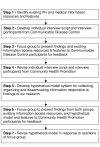Identifying strategies to improve access to credible and relevant information for public health professionals: a qualitative study
- PMID: 16597331
- PMCID: PMC1456961
- DOI: 10.1186/1471-2458-6-89
Identifying strategies to improve access to credible and relevant information for public health professionals: a qualitative study
Abstract
Background: Movement towards evidence-based practices in many fields suggests that public health (PH) challenges may be better addressed if credible information about health risks and effective PH practices is readily available. However, research has shown that many PH information needs are unmet. In addition to reviewing relevant literature, this study performed a comprehensive review of existing information resources and collected data from two representative PH groups, focusing on identifying current practices, expressed information needs, and ideal systems for information access.
Methods: Nineteen individual interviews were conducted among employees of two domains in a state health department--communicable disease control and community health promotion. Subsequent focus groups gathered additional data on preferences for methods of information access and delivery as well as information format and content. Qualitative methods were used to identify themes in the interview and focus group transcripts.
Results: Informants expressed similar needs for improved information access including single portal access with a good search engine; automatic notification regarding newly available information; access to best practice information in many areas of interest that extend beyond biomedical subject matter; improved access to grey literature as well as to more systematic reviews, summaries, and full-text articles; better methods for indexing, filtering, and searching for information; and effective ways to archive information accessed. Informants expressed a preference for improving systems with which they were already familiar such as PubMed and listservs rather than introducing new systems of information organization and delivery. A hypothetical ideal model for information organization and delivery was developed based on informants' stated information needs and preferred means of delivery. Features of the model were endorsed by the subjects who reviewed it.
Conclusion: Many critical information needs of PH practitioners are not being met efficiently or at all. We propose a dual strategy of: 1) promoting incremental improvements in existing information delivery systems based on the expressed preferences of the PH users of the systems and 2) the concurrent development and rigorous evaluation of new models of information organization and delivery that draw on successful resources already operating to deliver information to clinical medical practitioners.
Figures
Similar articles
-
Folic acid supplementation and malaria susceptibility and severity among people taking antifolate antimalarial drugs in endemic areas.Cochrane Database Syst Rev. 2022 Feb 1;2(2022):CD014217. doi: 10.1002/14651858.CD014217. Cochrane Database Syst Rev. 2022. PMID: 36321557 Free PMC article.
-
Beyond the black stump: rapid reviews of health research issues affecting regional, rural and remote Australia.Med J Aust. 2020 Dec;213 Suppl 11:S3-S32.e1. doi: 10.5694/mja2.50881. Med J Aust. 2020. PMID: 33314144
-
The future of Cochrane Neonatal.Early Hum Dev. 2020 Nov;150:105191. doi: 10.1016/j.earlhumdev.2020.105191. Epub 2020 Sep 12. Early Hum Dev. 2020. PMID: 33036834
-
Evidence Brief: The Effectiveness Of Mandatory Computer-Based Trainings On Government Ethics, Workplace Harassment, Or Privacy And Information Security-Related Topics [Internet].Washington (DC): Department of Veterans Affairs (US); 2014 May. Washington (DC): Department of Veterans Affairs (US); 2014 May. PMID: 27606391 Free Books & Documents. Review.
-
Evidence Brief: The Quality of Care Provided by Advanced Practice Nurses [Internet].Washington (DC): Department of Veterans Affairs (US); 2014 Sep. Washington (DC): Department of Veterans Affairs (US); 2014 Sep. PMID: 27606392 Free Books & Documents. Review.
Cited by
-
The complex nature of research dissemination practices among public health faculty researchers.J Med Libr Assoc. 2019 Jul;107(3):341-351. doi: 10.5195/jmla.2019.524. Epub 2019 Jul 1. J Med Libr Assoc. 2019. PMID: 31258440 Free PMC article.
-
Knowledge management tools and mechanisms for evidence-informed decision-making in the WHO European Region: a scoping review.Health Res Policy Syst. 2023 Oct 31;21(1):113. doi: 10.1186/s12961-023-01058-7. Health Res Policy Syst. 2023. PMID: 37907919 Free PMC article.
-
Uncovering tacit knowledge: a pilot study to broaden the concept of knowledge in knowledge translation.BMC Health Serv Res. 2011 Aug 18;11:198. doi: 10.1186/1472-6963-11-198. BMC Health Serv Res. 2011. PMID: 21851617 Free PMC article.
-
Barriers, facilitators and views about next steps to implementing supports for evidence-informed decision-making in health systems: a qualitative study.Implement Sci. 2014 Dec 5;9:179. doi: 10.1186/s13012-014-0179-8. Implement Sci. 2014. PMID: 25476735 Free PMC article.
-
A knowledge management tool for public health: health-evidence.ca.BMC Public Health. 2010 Aug 18;10:496. doi: 10.1186/1471-2458-10-496. BMC Public Health. 2010. PMID: 20718970 Free PMC article.
References
-
- Kiefer L, Frank J, Di Ruggiero E, Dobbins M, Manuel D, Gully PR, Mowat D. Fostering evidence-based decision-making in Canada: examining the need for a Canadian population and public health evidence centre and research network. Can J Public Health. 2005;96:I1–40. - PubMed
-
- Nutbeam D. Achieving 'best practice' in health promotion: improving the fit between research and practice. Health Educ Res. 1996;11:317–326. - PubMed
Publication types
MeSH terms
LinkOut - more resources
Full Text Sources
Miscellaneous




